初中语法---宾语从句,现在完成时
- 格式:doc
- 大小:78.00 KB
- 文档页数:9
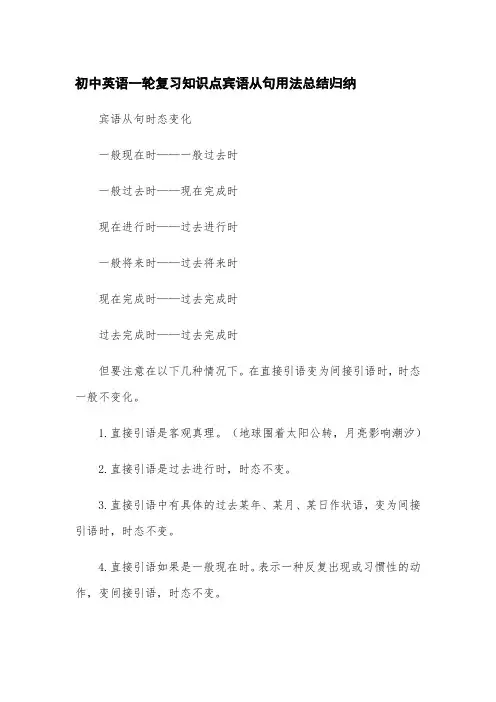
初中英语一轮复习知识点宾语从句用法总结归纳宾语从句时态变化一般现在时——一般过去时一般过去时——现在完成时现在进行时——过去进行时一般将来时——过去将来时现在完成时——过去完成时过去完成时——过去完成时但要注意在以下几种情况下。
在直接引语变为间接引语时,时态一般不变化。
1.直接引语是客观真理。
(地球围着太阳公转,月亮影响潮汐)2.直接引语是过去进行时,时态不变。
3.直接引语中有具体的过去某年、某月、某日作状语,变为间接引语时,时态不变。
4.直接引语如果是一般现在时。
表示一种反复出现或习惯性的动作,变间接引语,时态不变。
5.如果直接引语中的情态动词没有过去时的形式(例:ought to,had better, used to)和已经是过去时的形式时,(例:could, should, would, might)不再变。
宾语从句人称的变化:遵循一主二宾三不变"一主"是指在直接引语变间接引语时,如果从句中的主语是第一人称或被第一人称所修饰。
从句中的人称要按照主句中主语的人称变化。
如:She said. "My brother wants to go with me. "→She said her brother wanted to go withher."二宾"是指直接引语变间接引语时,若从句中的主语及宾语是第二人称。
或被第二人称所修饰。
从句中的人称要跟引号外的主句的宾语一致。
如果引号外的主句没有宾语。
也可以用第一人称。
如:He said to Kate. "How is your sister now?"→He asked Kate how her sister was then"三不变"是指直接引语变间接引语时。
如果从句中的主语及宾语是第三人称或被第三人称所修饰,从句中的人称一般不需要变化。
如:Mr Smith said. "Jack is a good worker。
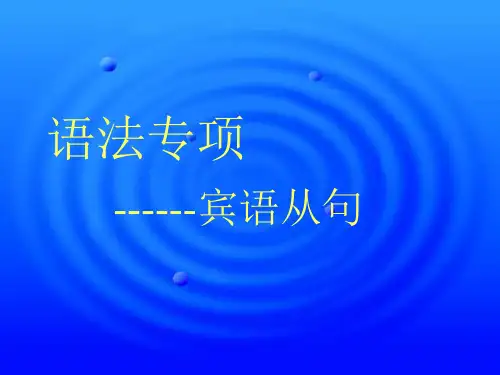
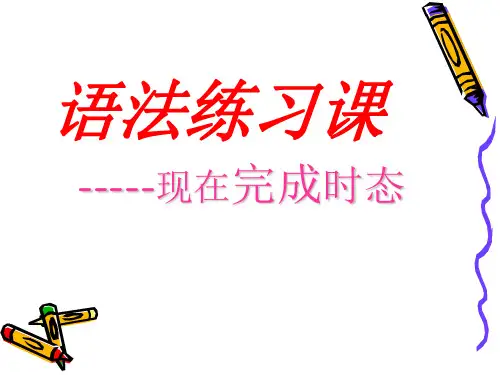
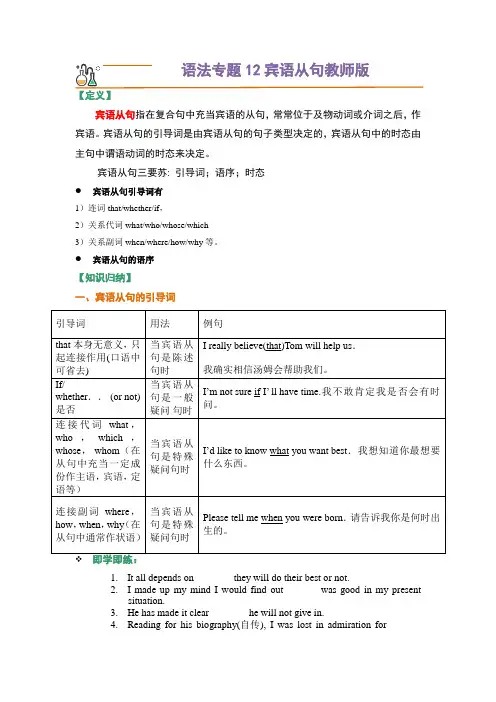
【定义】宾语从句指在复合句中充当宾语的从句,常常位于及物动词或介词之后,作宾语。
宾语从句的引导词是由宾语从句的句子类型决定的,宾语从句中的时态由主句中谓语动词的时态来决定。
宾语从句三要苏: 引导词;语序;时态●宾语从句引导词有1)连词that/whether/if,2)关系代词what/who/whose/which3)关系副词when/where/how/why等。
●宾语从句的语序【知识归纳】一、宾语从句的引导词引导词用法例句that本身无意义,只起连接作用(口语中可省去) 当宾语从句是陈述句时I really believe(that)Tom will help us.我确实相信汤姆会帮助我们。
If/ whether.. (or not)是否当宾语从句是一般疑问句时I’m not sure if I’ ll have time.我不敢肯定我是否会有时问。
连接代词what,who,which,whose, whom(在从句中充当一定成份作主语,宾语,定语等)当宾语从句是特殊疑问句时I’d like to know what you want best.我想知道你最想要什么东西。
连接副词where,how,when,why(在从句中通常作状语)当宾语从句是特殊疑问句时Please tell me when you were born.请告诉我你是何时出生的。
❖即学即练:1.It all depends on _______ they will do their best or not.2.I made up my mind I would find out ______ was good in my presentsituation.3.He has made it clear _______ he will not give in.4.Reading for his biography(自传), I was lost in admiration for ______语法专题12宾语从句教师版Steven Jobs had achieved.5.We now realize ______ important family are and how improtant to benear them.6.Over thousands of years, they began to depend less on ______ should behunted or fathered from the wild.7.What students do at college seems to matter much more than _____ theygo.8.I'm not sure ______ is more frightened, me or the female gorilla (大猩猩).9.Please hold on to ________ you are strong and try to improve the weaksubjects.10.The young couple was having an arguement about _______ turn it wasto do the cooking.填空题答案:1.Whether2. What3. That4. What5. How6. What7. Where8. Who9. Where 10. Whose二、宾语从句的语序宾语从句无论是陈述句、一般疑问句或特殊疑问句意义,一律用陈述句语序,即“主语+谓语”结构。
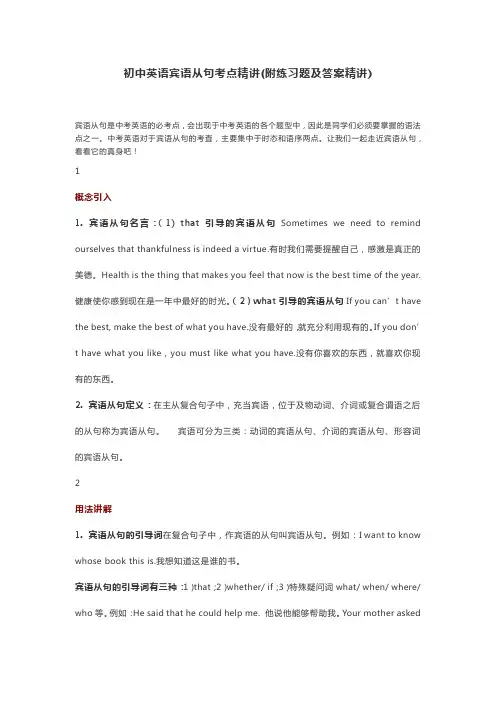
初中英语宾语从句考点精讲(附练习题及答案精讲)宾语从句是中考英语的必考点,会出现于中考英语的各个题型中,因此是同学们必须要掌握的语法点之一。
中考英语对于宾语从句的考查,主要集中于时态和语序两点。
让我们一起走近宾语从句,看看它的真身吧!1概念引入1. 宾语从句名言:(1) that引导的宾语从句Sometimes we need to remind ourselves that thankfulness is indeed a virtue.有时我们需要提醒自己,感激是真正的美德。
Health is the thing that makes you feel that now is the best time of the year.健康使你感到现在是一年中最好的时光。
(2)what引导的宾语从句If you can’t have the best, make the best of what you have.没有最好的,就充分利用现有的。
If you don’t have what you like,you must like what you have.没有你喜欢的东西,就喜欢你现有的东西。
2. 宾语从句定义:在主从复合句子中,充当宾语,位于及物动词、介词或复合谓语之后的从句称为宾语从句。
宾语可分为三类:动词的宾语从句、介词的宾语从句、形容词的宾语从句。
2用法讲解1. 宾语从句的引导词在复合句子中,作宾语的从句叫宾语从句。
例如:I want to know whose book this is.我想知道这是谁的书。
宾语从句的引导词有三种:1)that;2)whether/ if;3)特殊疑问词what/ when/ where/ who等。
例如:He said that he could help me. 他说他能够帮助我。
Your mother askedif you could finish your work this week.你妈妈问这个星期你能否完成工作。
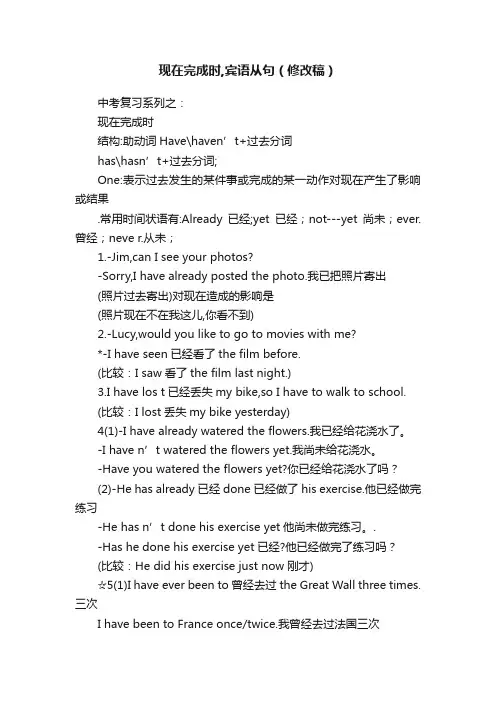
现在完成时,宾语从句(修改稿)中考复习系列之:现在完成时结构:助动词Have\haven’t+过去分词has\hasn’t+过去分词;One:表示过去发生的某件事或完成的某一动作对现在产生了影响或结果.常用时间状语有:Already已经;yet已经;not---yet尚未;ever.曾经;neve r.从未;1.-Jim,can I see your photos?-Sorry,I have already posted the photo.我已把照片寄出(照片过去寄出)对现在造成的影响是(照片现在不在我这儿,你看不到)2.-Lucy,would you like to go to movies with me?*-I have seen已经看了the film before.(比较:I saw看了the film last night.)3.I have los t已经丢失my bike,so I have to walk to school.(比较:I lost丢失my bike yesterday)4(1)-I have already watered the flowers.我已经给花浇水了。
-I have n’t watered the flowers yet.我尚未给花浇水。
-Have you watered the flowers yet?你已经给花浇水了吗?(2)-He has already已经done已经做了his exercise.他已经做完练习-He has n’t done his exercise yet他尚未做完练习。
.-Has he done his exercise yet已经?他已经做完了练习吗?(比较:He did his exercise just now刚才)☆5(1)I have ever been to曾经去过the Great Wall three times.三次I have been to France once/twice.我曾经去过法国三次I have been there twice.我去过那儿两次(2)I have ever/never been to Beijing.我曾经/从未去过北京。
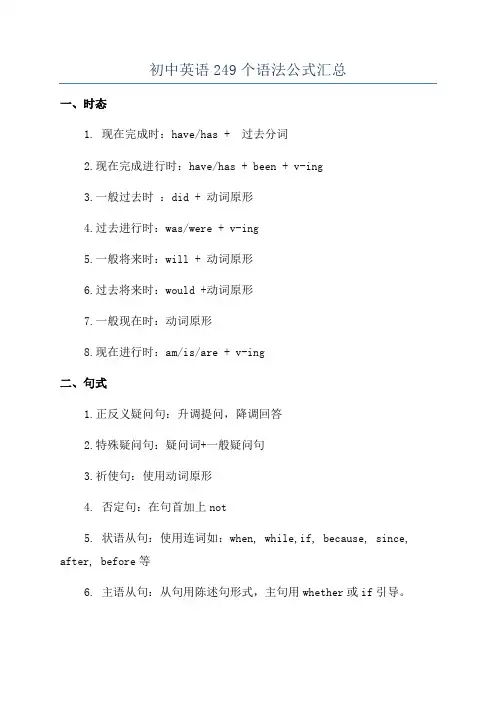
初中英语249个语法公式汇总一、时态1. 现在完成时:have/has + 过去分词2.现在完成进行时:have/has + been + v-ing3.一般过去时:did + 动词原形4.过去进行时:was/were + v-ing5.一般将来时:will + 动词原形6.过去将来时:would +动词原形7.一般现在时:动词原形8.现在进行时:am/is/are + v-ing二、句式1.正反义疑问句:升调提问,降调回答2.特殊疑问句:疑问词+一般疑问句3.祈使句:使用动词原形4. 否定句:在句首加上not5. 状语从句:使用连词如:when, while,if, because, since, after, before等6. 主语从句:从句用陈述句形式,主句用whether或if引导。
7. 宾语从句:从句用陈述句形式,主句要使用宾语从句的引导词如:what,who,which,that,why,whether等8. 同位语从句:从句用陈述句形式,主句要使用同位语从句的引导词如:what,who,which,that,why,whether等9. 定语从句:从句用陈述句形式,主句要使用定语从句的引导词如:what,who,which,that,why,whether等三、非谓语动词1. 不定式:to + 动词原形2. 动名词:动词+ing3. 分词:动词+ing或动词的过去分词4. 动词不定式:to + 动词的过去分词四、句型转换1.祈使句转换为陈述句:把祈使句中的动词原形改为一般现在时2.陈述句转换为祈使句:把陈述句中的动词原形改为动词原形3. 否定句转换为肯定句:把否定句中的not去掉。
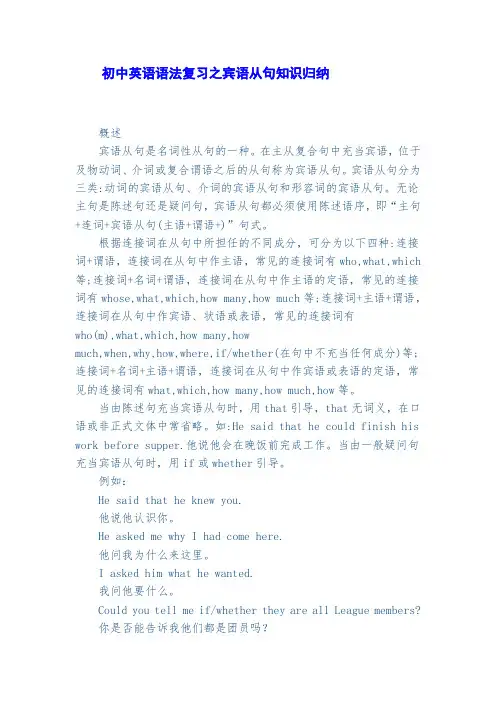
初中英语语法复习之宾语从句知识归纳概述宾语从句是名词性从句的一种。
在主从复合句中充当宾语,位于及物动词、介词或复合谓语之后的从句称为宾语从句。
宾语从句分为三类:动词的宾语从句、介词的宾语从句和形容词的宾语从句。
无论主句是陈述句还是疑问句,宾语从句都必须使用陈述语序,即“主句+连词+宾语从句(主语+谓语+)”句式。
根据连接词在从句中所担任的不同成分,可分为以下四种:连接词+谓语,连接词在从句中作主语,常见的连接词有who,what,which 等;连接词+名词+谓语,连接词在从句中作主语的定语,常见的连接词有whose,what,which,how many,how much等;连接词+主语+谓语,连接词在从句中作宾语、状语或表语,常见的连接词有who(m),what,which,how many,howmuch,when,why,how,where,if/whether(在句中不充当任何成分)等;连接词+名词+主语+谓语,连接词在从句中作宾语或表语的定语,常见的连接词有what,which,how many,how much,how等。
当由陈述句充当宾语从句时,用that引导,that无词义,在口语或非正式文体中常省略。
如:He said that he could finish his work before supper.他说他会在晚饭前完成工作。
当由一般疑问句充当宾语从句时,用if或whether引导。
例如:He said that he knew you.他说他认识你。
He asked me why I had come here.他问我为什么来这里。
I asked him what he wanted.我问他要什么。
Could you tell me if/whether they are all League members?你是否能告诉我他们都是团员吗?I’m interested in what he has said.我对他说的话很感兴趣。
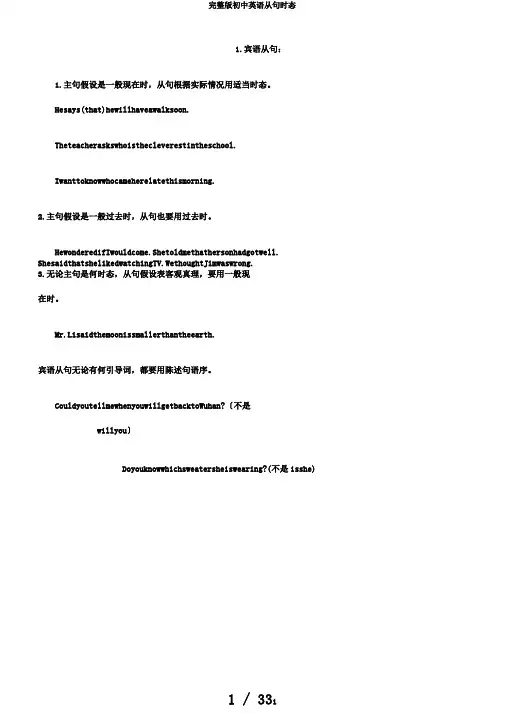
1.宾语从句:1.主句假设是一般现在时,从句根据实际情况用适当时态。
Hesays(that)hewillhaveawalksoon.Theteacheraskswhoisthecleverestintheschool.Iwanttoknowwhocameherelatethismorning.2.主句假设是一般过去时,从句也要用过去时。
HewonderedifIwouldcome.Shetoldmethathersonhadgotwell. ShesaidthatshelikedwatchingTV.WethoughtJimwaswrong.3.无论主句是何时态,从句假设表客观真理,要用一般现在时。
Mr.Lisaidthemoonissmallerthantheearth.宾语从句无论有何引导词,都要用陈述句语序。
CouldyoutellmewhenyouwillgetbacktoWuhan?〔不是willyou〕Doyouknowwhichsweatersheiswearing?(不是isshe)2.状从句:1主句假设是一般将来、祈使句或含不表去的情等,if(如果),unless(除非),when(当⋯的候),assoonas(一⋯就⋯),before,after,until,till,as(当⋯的候)所引的状从句用一般在。
Youmaytakearestwhenyoufinishdoingyourwork.IwillcallyouupifIleaveforShanghainextweek.Waitforyourbrotheratthebusstationuntilhearrives.而主句假设是一般去,从句也要用去,如:IwouldgivethemoneytothecharityifIhadamilliondollars.Whenhegottothepark,hisclassmateshadleft.Mysonrantowardsmeassoonashesawmeonthestreet.3.定从句:关系代who只指人,which只指物。
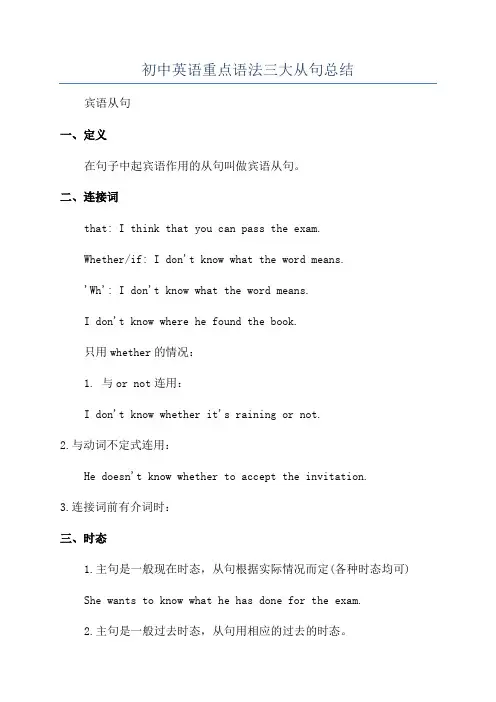
初中英语重点语法三大从句总结宾语从句一、定义在句子中起宾语作用的从句叫做宾语从句。
二、连接词that: I think that you can pass the exam.Whether/if: I don't know what the word means.'Wh': I don't know what the word means.I don't know where he found the book.只用whether的情况:1. 与or not连用:I don't know whether it's raining or not.2.与动词不定式连用:He doesn't know whether to accept the invitation.3.连接词前有介词时:三、时态1.主句是一般现在时态,从句根据实际情况而定(各种时态均可)She wants to know what he has done for the exam.2.主句是一般过去时态,从句用相应的过去的时态。
1)She said that she was a student.2)She said that she would fly to Japan in a week.3)She said that she had finished her homework already.3.如果宾语从句说的是客观真理、自然现象或事实时,这时宾语从句要用一般现在时态。
The teacher said that the earth goes round the sun.定语从句一、定义在复合句中修饰名词、代词的从句叫定语从句。
二、先行词先行词指人 who /that先行词指物 which/ that定语从句一般紧跟被修饰的名词或代词(即先行词)后三、关系代词关系代词代替先行词在句子中担当成分,所以从句中不可再出现其他代替先行词的代词四、翻译方法'….的'Whom: 先行词指人,则代替先行词在定语从句中充当宾语(包括介词的宾语), 与who的区别是如果前面带介词则必须用whom1. This is the teacher whomwho we like best.2. I don't like the boy to whom you are talking.Whose : 指人或物,作定语,表示'…的'eg: Harry is the boy whose mother is our math teacher.关系代词只能 that 的特殊情况:1.先行词前有序数词修饰时:This is the first gift that my parents bought me.2.先行词前有形容词最高级修饰时:This is the most exciting film that I have ever seen.3. 先行词是不定代词something, anything等时.e.g. Is there anything that you want in this shop4. 先行词是人和物时, 用that.e.g. He talked about some writers and books that were unknown to us all.5. 先行词被all , little , the only , the very(就是,正是), the last 等词修饰时,只能用thate.g. This is the last place that I want to visit.6. 特殊疑问句以who 或which 开头,只能用that引导.Who is the girl that is making a speech on the platform当关系代词前使用介词时:物+介词+which ; 人+ 介词 + whom当关系代词前使用介词时:e.g. 1. This is the train by which we went to Beijing.2. This is the teacher to whom my mother is talking.状语从句一、定义在复合句中由从句表示的状语称作状语从句,它可以用来修饰谓语(包括非谓语动词)、定语或状语,或是整个句子。
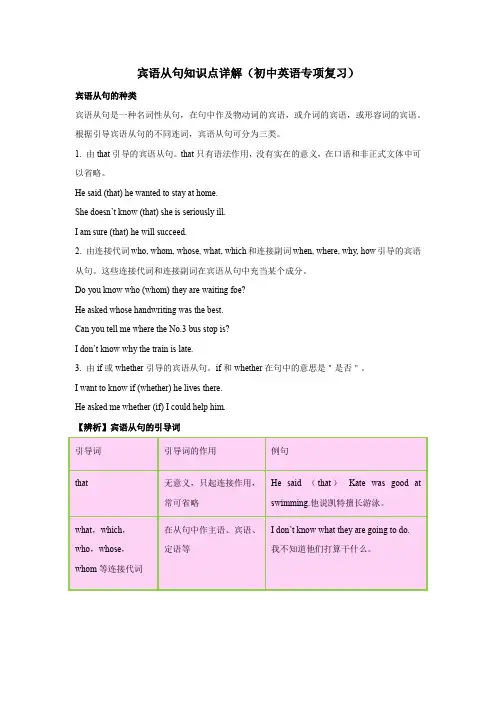
宾语从句知识点详解(初中英语专项复习)宾语从句的种类宾语从句是一种名词性从句,在句中作及物动词的宾语,或介词的宾语,或形容词的宾语。
根据引导宾语从句的不同连词,宾语从句可分为三类。
1. 由that引导的宾语从句。
that只有语法作用,没有实在的意义,在口语和非正式文体中可以省略。
He said (that) he wanted to stay at home.She doesn’t know (that) she is seriously ill.I am sure (that) he will succeed.2. 由连接代词who, whom, whose, what, which和连接副词when, where, why, how引导的宾语从句。
这些连接代词和连接副词在宾语从句中充当某个成分。
Do you know who (whom) they are waiting foe?He asked whose handwriting was the best.Can you tell me where the No.3 bus stop is?I don’t know why the train is late.3. 由if或whether引导的宾语从句。
if和whether在句中的意思是"是否"。
I want to know if (whether) he lives there.He asked me whether (if) I could help him.【辨析】宾语从句的引导词【典例】—Simon, you look smart in the T-shirt. Could you tell me ___________ it?—OK. I bought it in a store online.A. where you boughtB. where do you buyC. when you buyD. when did you buy【试题解析】句意:——西蒙,你穿这件T恤看起来很帅。
初中宾语从句一、定义宾语从句是英语复合句中非常重要的从句之一,也是初中阶段要求重点掌握的从句。
宾语从句属于名词性从句,是用一个句子做另一个句子的宾语。
宾语从句一般做介词或及物动词的宾语,如:We all expect that they will win.我们所有人都盼着他们能赢。
(动宾)We are talking about whether we should keep the money.我们正在讨论是否应该收下这笔钱。
(介宾)二、宾语从句的连接词宾语从句的引导词很多样,基本涵盖了从句中涉及的所有引导词,可分为从属连词,连1. 若主句是现在时的某种时态(一般现在时,现在进行时,现在完成时),宾语从句不受限制,可以根据实际情况随意穿越,如:I remember he gave me a book yesterday.我记得他昨天给了我一本书。
He has told me that he will leave for Shanghai next week.他已经告诉我下周他就要动身去上海了。
2. 若主句是过去时的某种时态(包括一般过去时,过去进行时),那么宾语从句一般要用过去的某种时态(包括一般过去时,过去进行时,过去将来时,过去完成时),如:I only knew he was studying in a western country.我只知道他当时在西方的一个国家读书。
My teacher told me that Mrs. Rosemary had been back to Australia already.我的老师告诉我,Rosemary夫人已经回澳大利亚了。
He told me that he would take part in the high jump.他告诉我他将会参加跳高。
3. 若从句是一个客观真理,那么从句用一般现在时,不根据主句的时态而变化,如:He told me that the earth goes around the sun.(真理)他告诉我地球围着太阳转。
宾语从句用法小结宾语从句是初中英语中最重要的语法之一。
中考经常会出现相关的题目。
掌握宾语从句应注意引导词(连词),语序以及时态三方面要素。
下面的表格可以帮助大家理解这一部分内容宾语从句的时态问题所谓过去的某个时态指的是如下的变化接下来我们一起来具体了解宾语从句的用法以及应注意点(你认为重要的或者容易出错的地方最好用红笔划出来)一、宾语从句的引导词1. 当由陈述句来充当宾语从句时,用that引导,that无词义常省略。
eg. I think (that) he is right.I know (that) she is a Canadian athlete.I’m sure (that) he will get the job.I’m glad (that) you are trying to help others.He tells me (that) he will work hard this term.特别注意:宾语从句否定意义的转移。
若主句的谓语动词是think , believe , suppose, guess等词,而且主句的主语是第一人称时候,如果从句谓语是否定的,一般要将否定词not转移至主句谓语上去,而将从句谓语改为肯定形式。
如:I don’t think he has time to come to the party .2. 当由特殊疑问句做宾语从句时,引导词由原来的特殊疑问词来充当。
有意义不能省略。
从句的语序要用陈述语序。
句末的标点符号由主句决定。
常出现的特殊疑问词:when, why, how, where, who、whom、whose、which, what等。
eg. 1) He asks. How can they get to school?He asks how they can get to school.2) Do you know? When did he buy this pen?Do you know when he bought this pen?3) Can you tell me ? What is your name?Can you tell me what your name is?3. 当由一般疑问句充当宾语从句时,用if或whether引导,意为“是否”“是不是”“能否”等。
九年级英语十大必考语法点九年级英语十大必考语法点一. 宾语从句1. 宾语从句的含义在整个句子中做宾语的从句叫做宾语从句。
如:She knew that the teacher had seen the film.她知道这位老师看过这部电影。
(“that the teacher had seen the film”做 knew 的宾语,同时又是由连接词 that 引导的从句,所以它叫做宾语从句。
)2. 宾语从句的分类(1)动词宾语从句:顾名思义,它是位于动词后面的宾语从句。
例如:He asked whose handwriting was the best in our class.他问我们班上谁的书法最好。
(2)介词宾语从句:顾名思义,它是位于介词后面的宾语从句。
例如:I agree with what you said just now.我同意你刚才说的话。
(3)形容词宾语从句:顾名思义,它是位于形容词后面的宾语从句。
例如:I am afraid that I will be late. 恐怕我要迟到了。
3. 引导名词性从句的连接词(1)that:没有含义,在宾语从句中不做成分(2)whether/if:表示是否,在宾语从句中不做成分。
I don't know if /whether he still lives here after so many years. 我不知道这么多年后,他是否还住在这里。
(3)连接代词:what, which, who, whom, whose(在宾语从句中做主、宾、表和定语)连接副词:where, when, how, why(在宾语从句中做状语)The small children don't know what is in their stockings.(what 在宾语从句中做主语)这些小孩子不知道什么在他们的长筒袜里。
Could you tell me why you were late for the meeting this morning?(why 在宾语从句中做原因状语)你能告诉我为什么你今天早上开会迟到吗?4. 在做宾语从句的题目时应注意两点(1)时态①当主句是现在时态时,宾语从句可以根据需要使用任何时态。
宾语从句的用法【用法讲解】考试要求:宾语从句在中考中是重点考查内容,主要考查知识包括宾语从句的引导词、宾语从句的语序及宾语从句时态对应及否定迁移等。
1. 宾语从句的引导词在复合句子中,作宾语的从句叫宾语从句。
例如:I want to know whose book this is.我想知道这是谁的书。
宾语从句的引导词有三种:1)that;2)whether/ if;3)特殊疑问词what/ when/ where/ who 等。
例如:He said that he could help me. 他说他能够帮助我。
Your mother asked if you could finish your work this week.你妈妈问这个星期你能否完成工作。
Can you tell me when the sports meeting will begin?你能告诉我运动会将在什么时候开始吗?(1) 以that引导的宾语从句:that引导的宾语从句一般都是由陈述句充当,引导词that没有实际意义,不在从句中作任何成分,that可以省略,而且从句成分齐全,句意完整。
Do you think (that) it will rain? 你认为天会下雨吗?He said (that) he could come on time. 他说他会准时来的。
(2) 以whether或if引导的宾语从句:从属连词if, whether引导的名词从句是由一般疑问句或选择疑问句转化而来的,变成从句后,语序由原来的倒装语序变成陈述语序。
whether和if意为“是否”。
Let us know whether / if you can finish the work before Friday.请让我们知道你是否能在星期五以前把工作做完。
I don’t care whether you like the story or not.我不在乎你是否喜欢这个故事。
宾语从句英语语法宾语从句(一)在复合句中用作宾语的从句叫做宾语从句。
宾语从句是初中英语中最重要的一种从句,它内容完整,句型结构较为复杂,主句和从句时态搭配要求严格,在中考试题中频频出现。
而且学好宾语从句也可为到高中学习间接引语、主语从句、表语从句及同位语从句打下良好的基础。
宾语从句常由that引导,在口语中常省略。
当主句中谓语动词是现在或将来时态时,从句中谓语动词不受主句中谓语动词时态的影响,按需要可以使用任何时态。
如:She says (that) she works from Monday to Friday. 她说她从周一至周五上班。
(从句是一般现在时)She says (that) she will leave a message on his desk. 她说她要在他桌子上留个便条。
(从句是一般将来时)She says (that) she has never been to Mount Emei. 她说她从来没有去过峨眉山。
(从句是现在完成时)当主句谓语是过去时态,从句中的时态一般用表示过去的某种时态。
如:He said there were no classes yesterday afternoon. 他说昨天下午没有课。
(从句是一般过去时)He said (that) he was going to take care of the baby. 他说他会去照看这个婴儿。
(从句是过去将来时)He said (that) they were having a meeting at that time.他说他们那时正在开会。
(从句是过去进行时)当主句谓语是过去时态,而宾语从句叙述某一客观真理(事实)时,宾语从句的时态则用一般现在时。
如:The teacher told us(that) nothing is difficult if you put your heart into it.老师告诉我们世上无难事只怕有心人。
初中语法---宾语从句,现在完成时在复合句中用作宾语的从句叫宾语从句。
1.语序无论主句是陈述句还是疑问句,宾语从句都必须使用陈述语序,即“主句+连词+宾语从句(主语+谓语+……)”句式。
根据连接词在从句中所担任的不同成分,可分为以下四种:1)连接词+谓语。
连接词在从句中作主语。
常见的连接词有:who,what,which等。
如:Could you tell me who knows the answer,please?你能告诉我谁知道答案吗?The small children don't know what is in their stockings.这些小孩子不知道袜子里有什么东西。
2)连接词+名词+谓语。
连接词在从句中作主语的定语。
常见的连接词有:whose,what,which,how many,how much等。
如:He asked whose handwriting was the best in our class.他问我们班上谁的书法最好。
The teacher asked us how many people there were in the room.老师问我们房间里有多少人。
3)连接词+主语+谓语。
连接词在从句中作宾语、状语或表语。
常见的连接词有:who(m),what,which,how many,how much,when,why,how,where,if /whether(在句中不充当任何成分)等。
如:He hasn't decided if he'll go on a trip to Wuxi.他还没决定是否去无锡旅行。
Could you tell me what I should do with the money ?你能告诉我我如何处理这笔钱吗?4)连接词+名词+主语+谓语。
连接词在从句中作宾语或表语的定语。
常见的连接词有:what,which,how many,how much,how等。
如:Do you know which class he is in ?你知道他在哪个班吗?She asked me if I knew whose pen it was.她问我是否知道这是谁的钢笔。
2.连接词1)当由陈述句充当宾语从句时,用that引导,that无词义,在口语或非正式文体中常省略。
如:He said that he could finish his work before supper.他说他会在晚饭前完成工作。
2)当由一般疑问句充当宾语从句时,用if或whether引导,意为“是否”。
如:I don't know if /whether he still lives here after so many years.我不知道这么多年后他是否还住在这儿。
3)如果宾语从句原来是特殊疑问句,只需用原来的特殊疑问词引导。
如:Could you tell me why you were late for the meeting this morning?你能告诉我今天早上你为什么开会迟到吗?3.时态含宾语从句的复合句,主、从句谓语动词的时态呼应应包括以下三点内容:1)如果主句的谓语动词是一般现在时,从句的谓语动词可根据需要,选用相应的任何时态。
如:I don't know when he will come back.我不知道他将何时回来。
He tells me that his sister came back yesterday.他告诉我他姐姐昨天回来了。
2)如果主句的谓语动词是过去时,宾语从句的谓语动词只可根据需要,选用过去时态即一般过去时、过去进行时、过去将来时或过去完成时的某一种形式。
如:①The children didn't know who he was.孩子们不知道他是谁。
②He asked his father how it happened.他问他父亲这件事是如何发生的。
3)如果宾语从句所表示的是客观事实、普遍真理、自然现象或习惯性动作等,不管主句用什么时态,从句时态都用一般现在时。
如:The teacher said that the earth goes round the sun.老师说地球绕着太阳转。
初中英语宾语从句语法专项精选试题习题(一)1 The girls asked if they ____ some food and drink with them.A. tookB. takeC. takesD. will take2 Catherine said that she ___ to Guangzhou.A. has never goneB. had never goneC. has never beenD. had never been3 The students want to know whether they___ dictation today.A. hadB. has .C. will haveD. are4 She asked Linda if___ go and get some.A. could sheB. she couldC. she canD. she may5 Linda said the moon___ round the earth.A. travelledB. has travelledC. travellsD. had travelled答案:1-5 A D C B C习题(二)1 Can you tell me___ you were born, BettyA. whoB. whatC. whenD. that2 I don't know ___ they have passed the exam.A. whatB. ifC. whenD. where3 I hardly understand. ___ he has told me.A. thatB. whatC. whichD. who4 She didn't know___ back soon.A. whether he would beB. if would he beC. he will be5. I don't know _____ he still lives here after so many years.A. whether B where C. what D. when6. Do you know _____ they listened to yesterday eveningA. what B when C why D how7. He asked me _____told me the accident.A whomB whichC whoD whose答案:1-7 C B B A A A C习题(三)1. They don't know their parents are.A thatB whatC whyD which2. Please tell me ______what last year.A. where does your sister work B where did your sister work C where your sister works D where your sister worked3. She asked me if I knew ______.A. whose pen is itB. whose pen it wasC. whose pen it isD. whose pen was it4. You must remember ________.A. what your mother saidB. what did your mother sayC. your mother said whatD. what has your mother said5 Did you know ____A. who he was looking afterB. who was he looking forC. who he is looking forD. who he is looking after6 Could you tell me ___A. when will they leave BeijingB. when would they leave BeijingC. when they will leave BeijingD. when did they leave Beijing答案:1-6 B D B A A C习题(四)1. In the bookshop, a reader asked the shop keeper _____ Who Moved My Cheese was an interesting book. (北京市东城区)A. thatB. howC. whatD. if2. —I don't know _____ Mr. Green will come to see us.—He will help us with our English. (杭州市)A. whyB. whenC. howD. where3. —We never know _____ the old m an is.—They say he is a teacher. (鄂州市)A. whatB. whoC. whichD. where4. I was told _____ Bill Gates was thirteen he began to play with computers. (重庆市)A. that howB. how thatC. when thatD. that when5. —Do you know _____ I'm going to see him.—Sorry, I don't know. (北京市海淀区)A. where does Mr. Li liveB. where did Mr. Li liveC. where Mr. Li livesD. where Mr. Li lived6. —W here do you think _____ he _____ the computer—Sorry, I have no idea. (南京市)A. /; boughtB. has; boughtC. did; buyD. does; buy7. I don't feel very well. Mum asked me _____ this morning. (重庆市)A. what the matter isB. what is wrongC. what the matter wasD. what wrong was8. —Where is Jack—He is away to spend his holiday. He's gone either to Hangzhou or to Wuhan, but I'm not sure _____ . (南昌市)A. thatB. whichC. whereD. there答案:1—4 D A A D 5—8 C A C C注意:(1)连词that引导的名词性从句很少作介词的宾语,只用在except,but和in等少数几个介词后。